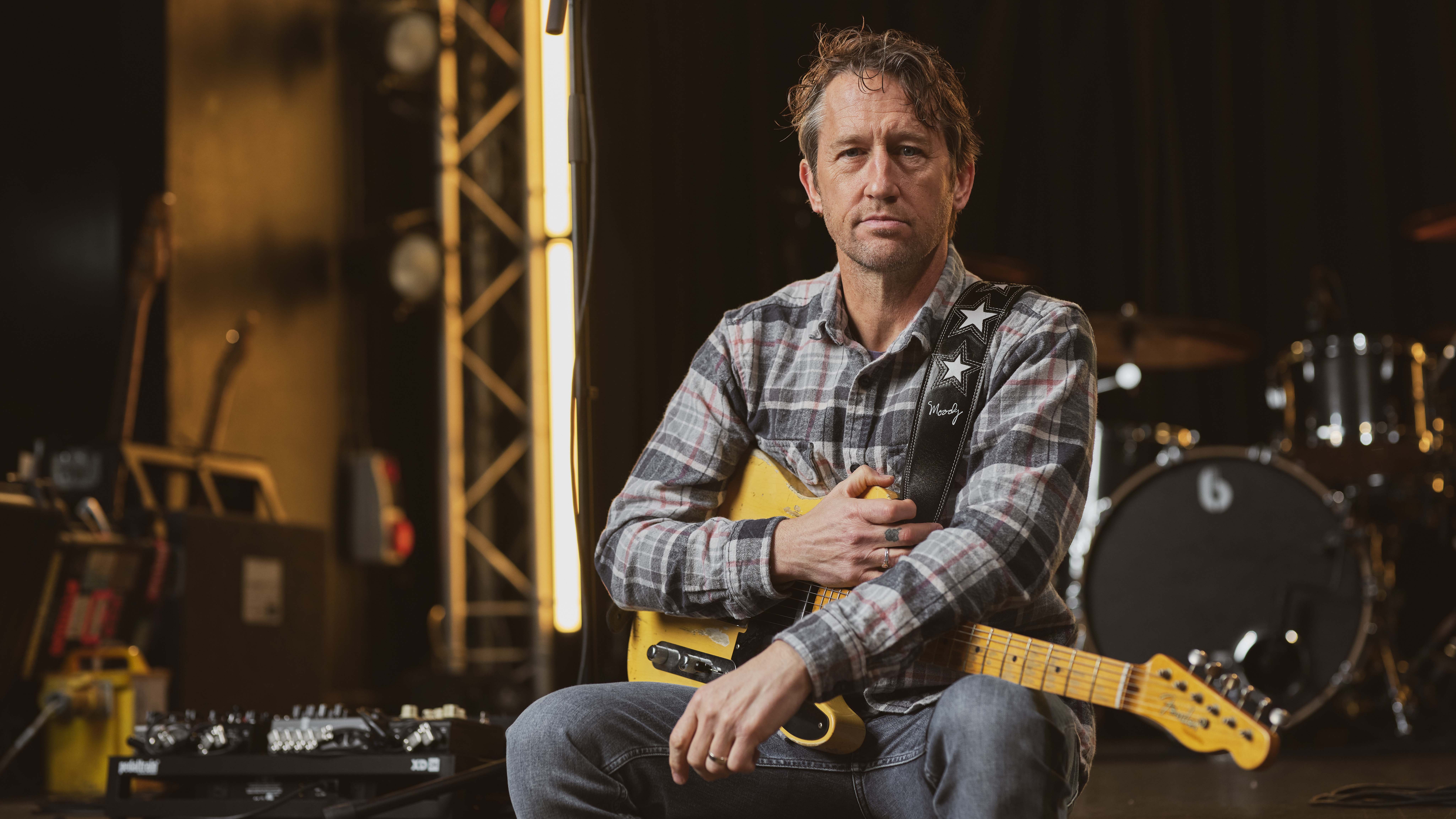"I'm a fuzz junkie – I've got an obscene amount of fuzz boxes": Feeder's Grant Nicholas picks his essential pieces of gear
Feeder's frontman shares why he loves writing on an acoustic guitar, the story of purchasing his first Fender Jazzmaster and loving a pedal so much he named a song after it
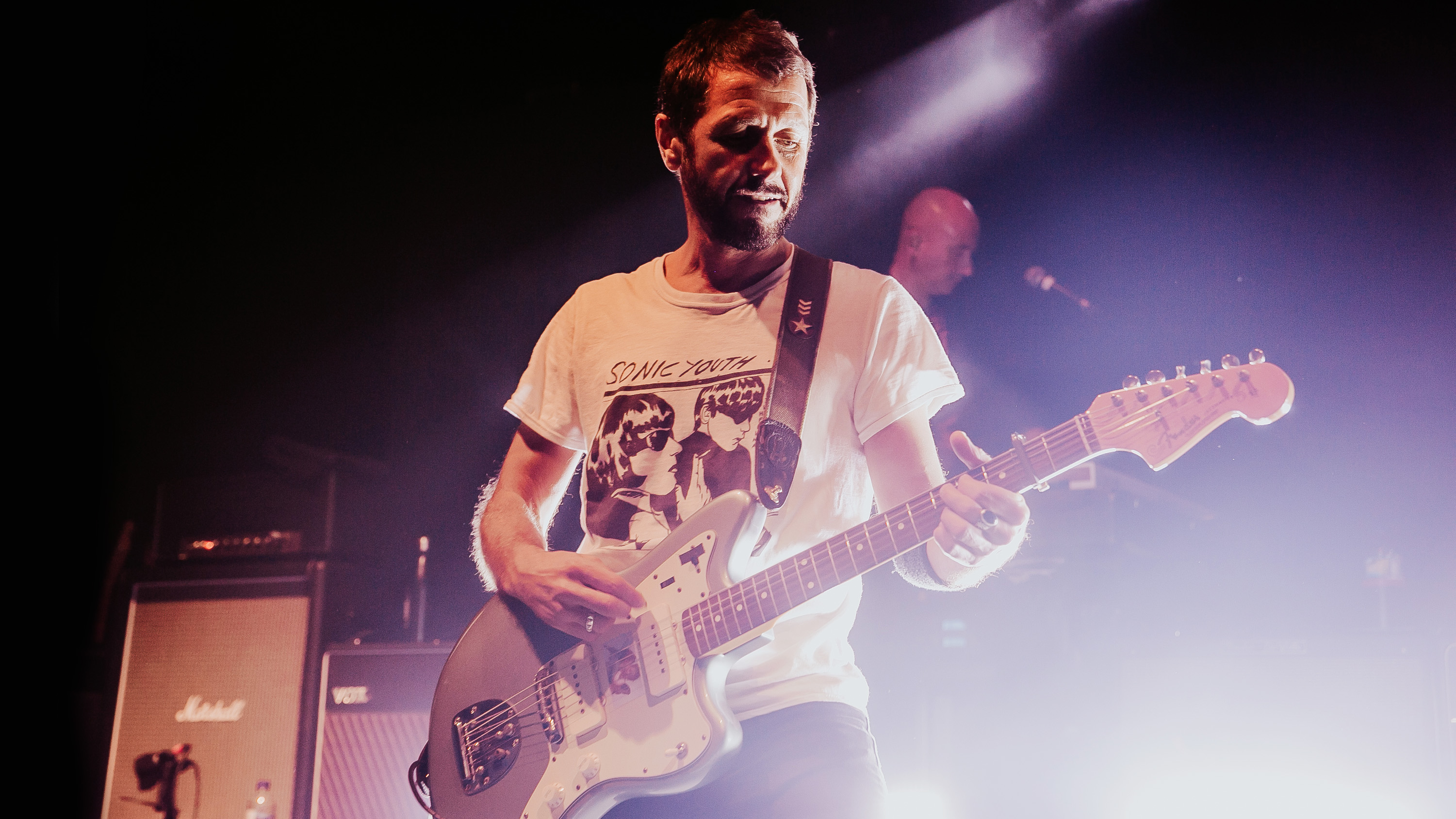
Want all the hottest music and gear news, reviews, deals, features and more, direct to your inbox? Sign up here.
You are now subscribed
Your newsletter sign-up was successful
Feeder's world-class songwriting, gloriously fuzzed-out guitars and infectious live shows stand as an inspiration to any guitar band that wants to understand what it takes to build a loyal fanbase and multi-decade career.
Grant Nicholas's band has worked tirelessly at their craft and has been rewarded with 30 years of hit after hit and a growing fanbase that is hungry for more. Well, Feeder has heard their cries and over-delivered, releasing a whopping 18 tracks as part of their new double album, Black/Red, which rounds out a trilogy with their previous critically acclaimed release, Torpedo.
Feeder's approach to their double album is a bit of a rarity. Unlike many bands whose attempts can feel bloated and disjointed, Feeder's Black/Red is a cohesive, masterful collection of songs that certainly stands on its own.
We had the opportunity to delve into the creative process of Feeder's lead singer, guitarist, and main songwriter, Grant Nicholas. He shared with us the reasons behind the band's decision to launch a double album after 30 years and how they managed to avoid the pitfalls that many other ambitious bands have fallen into.
Speaking to Grant from his kitchen, not far from the garden studio where he tracks much of Feeder's guitars now, the frontman let us know that the time just felt right to launch a dual record – something he was even toying with on the previous album, but he let his doubts cloud his judgment.
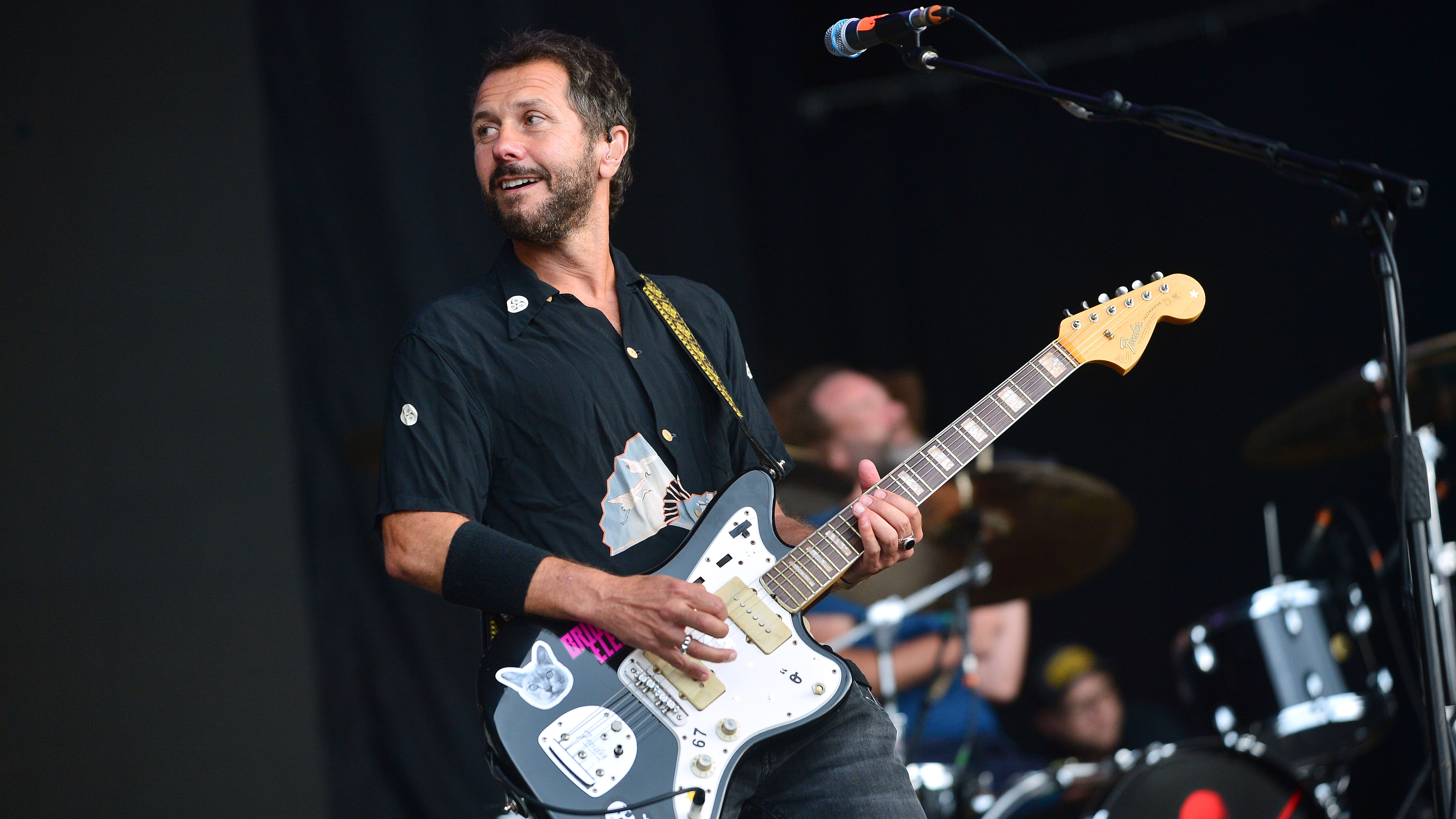
A lot of double albums have a lot of filler
"I've always wanted to do one," he tells us. "I always thought it was a real statement. I mean, I'm always writing songs. I'm quite lucky, I'm never really short of material. I know a few '90s bands did it, but we never really got around to it then, so it just felt like a good time to do it.
"I suppose it's just trying new things and trying to keep it interesting for us and give something new to the fanbase as well. I've always thought about it in the back of my mind, but I also wanted to make sure it was a really strong record. A lot of double albums have a lot of filler. I really wanted this to be almost like two standalone albums in one that would stand up in their own right.
Want all the hottest music and gear news, reviews, deals, features and more, direct to your inbox? Sign up here.
"We wanted to do a double album on Torpedo but I got cold feet, thinking, 'Should we just sort of put this one out and maybe do it next time?' Some of these songs were written even before some of the Torpedo stuff – not many, but a few. Some were written during lockdown. I've still got a whole load of music we haven't used yet. I've got basically another album's worth. So it could have been a triple album [laughs], but some of the other stuff felt slightly different, like sonically, a slightly different vibe. So I've kept that back for another record."
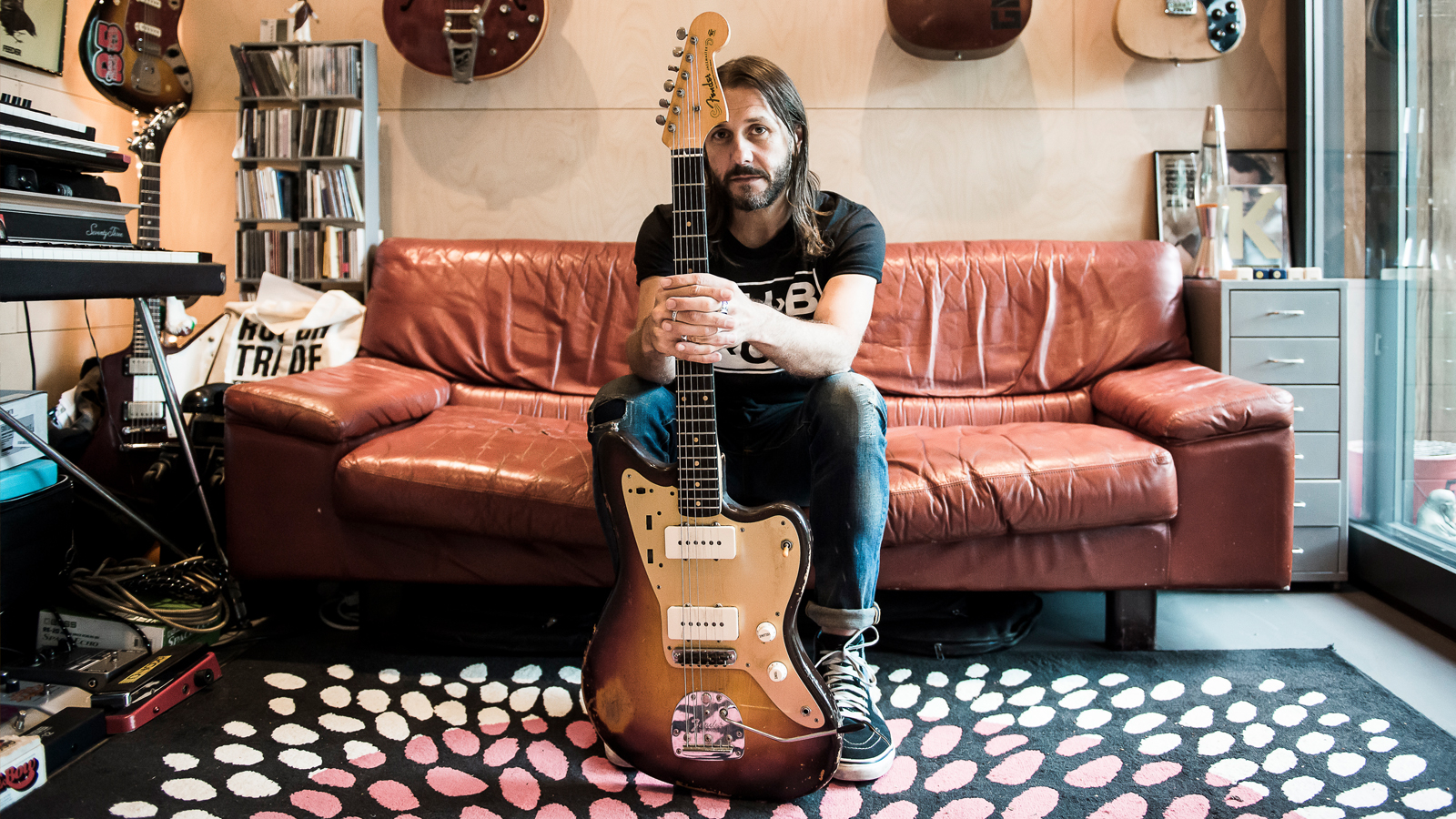
Nicholas may have gotten over the jitters he had when producing the last record, but the singer admits he still very much felt the pressure to get this extended album right and worried that such a lengthy release might not land with a 2024 audience.
"I felt the pressure a bit at the end thinking in this day and age where albums come and go so quickly, [is it too much] material to put out there? There's always that fear, and it's brave doing a double album, I think – but I had confidence in the record and we worked hard on it.
"The nice thing about having a lot of songs on the record is you can put out quite a lot of material, and people still haven't heard a lot of the record. This being 18 tracks, it kind of enabled us to put out a bit more and let people know what they're going to be getting on the record."
Part of the magic of this new Feeder record is how it seamlessly connects to the band's previous effort while also pushing the group's sound forward.
An animated Grant sheds some light on the thought process of connecting the three parts together, saying, "Torpedo does feel very much like it's connected to this. Sonically, I wanted this record to have a similar kind of [sound] to Torpedo to feel like it could sit alongside it. If you were to mix all the songs up, I think they would still fit, you know?"
I think I play to my strengths as a writer. I'm not trying to try to become a new band every time we do a record.
Of course, the album doesn't just pull from 2022's Torpedo. "I think there are elements of Pushing The Senses on this in places and Comfort And Sound even, and some of our really early records, but there's also, hopefully, classic Feeder [in there]. I feel like we're still moving forward as a band.
"I think I play to my strengths as a writer. I'm not trying to become a new band every time we do a record. It's important to keep it fresh and interesting for yourselves and the fans, but you also have to keep your own identity as a band."
Now, as you can imagine, after 30 years in the business, Grant has amassed a rather impressive collection of gear, but there are a few choice pieces that he relies on time and time again when writing and recording. So, without further ado, here’s Grant’s pick of his essential pieces of gear that he simply couldn’t live without – fans of the band are sure to recognize a few very familiar faces.
1. 1967 Gibson J-45
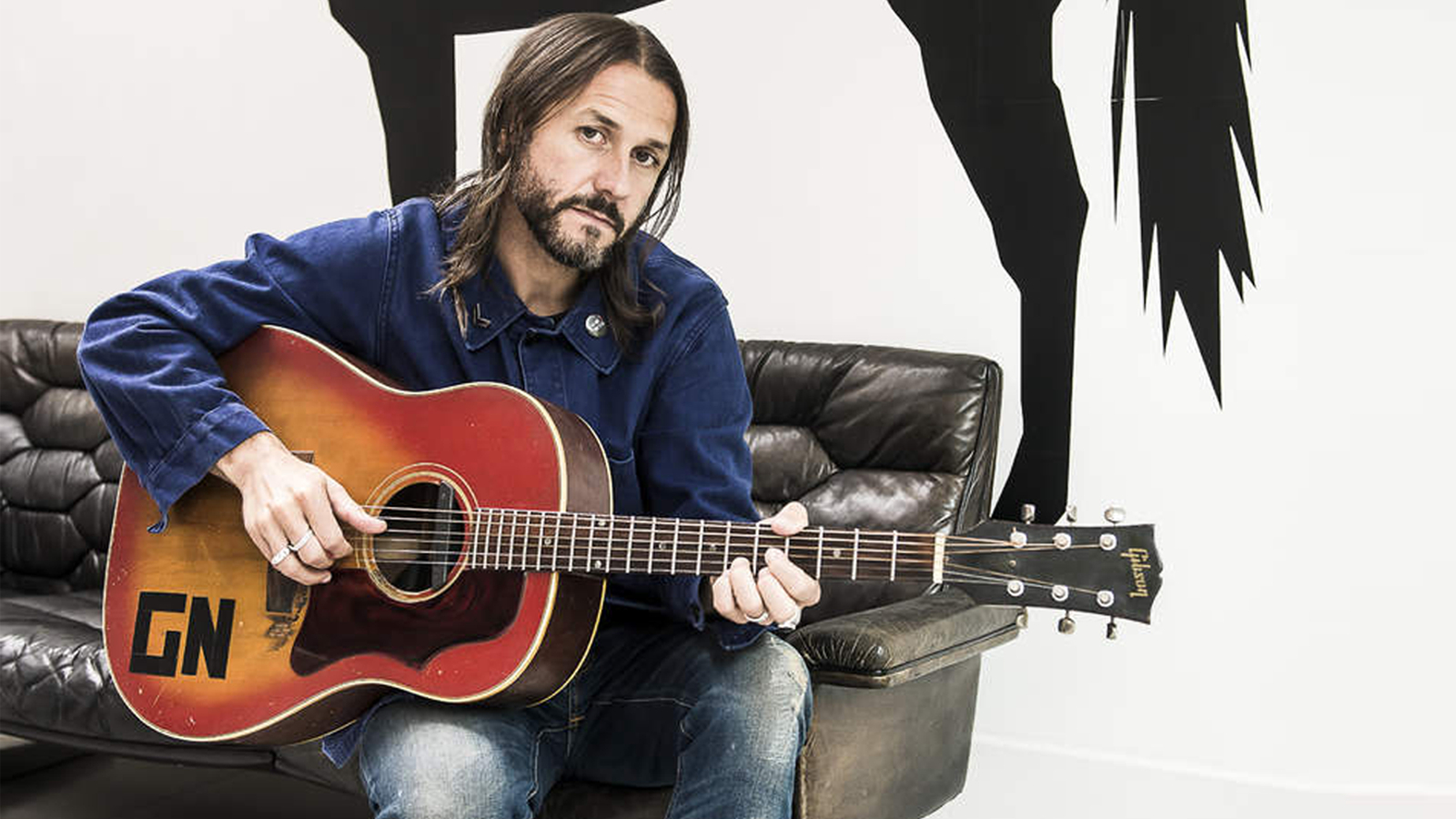
Many songwriters praise the importance of having a good acoustic guitar in one's arsenal, and Nicholas is no different. His beloved Gibson J-45 has become his go-to writing tool.
“I'd say one of the most essential things for me is probably an acoustic guitar. I've got one or two that I use a lot. When I do a lot of writing [I use] an old 1967 Gibson J-45. I've had it for quite a while, it's just got a really nice neck and it's got very low action on it, which is just really great for picking up – you can play a lot of electric parts on it. It's just a guitar that lives with me all the time.
“I would say acoustic guitar is great because it's portable. If you've got an acoustic, you can have one in a hotel room, backstage, or in the kitchen. I do a lot of writing here in the kitchen, to be honest. Even where I'm sat now, I've written loads of songs here. I don't need to be in a studio to write songs.
“I've got a [Gibson] J-200, which is one of my oldest, you know, my first decent acoustic. I mean, before that, I used to play Yamaha acoustics. They were great. You know, stuff like High, that's just a Yamaha acoustic on that. I mean, there are no rules with acoustic guitars. I've got a Martin in there. It's great, like an old Martin, like really old, from 1938. It's great, but I don't use it as much as my J-45 because I prefer the J-45 to play. There are no rules. You don't have to spend a lot of money on an acoustic.
“I had this old Yamaha. It was just one I bought in New York. I was doing a radio thing, and I didn't have an acoustic with me. It was about $80, and it was a great-sounding guitar. I used it on so many Feeder tracks. I didn't have a Gibson back then. Sometimes, you just pick one up, and they play and sound great.
"So yeah, the acoustic is an essential piece for me personally just as a writer."
2. 1966/1959 Fender Jazzmaster
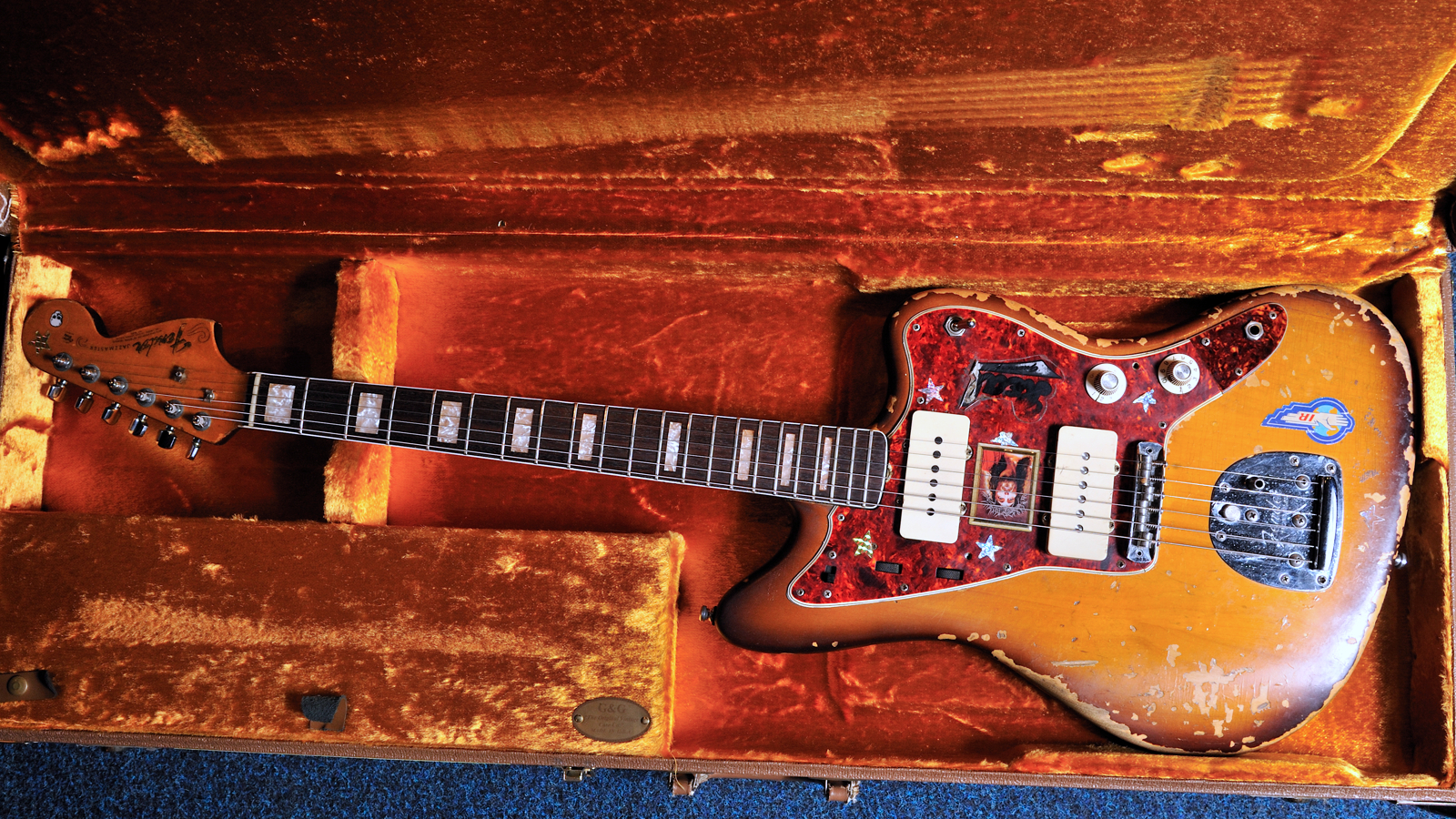
Now, if there’s one model of electric guitar Nicholas is most known for, it would be Fender’s offset classic, the Jazzmaster. It’s no surprise then that a couple would make his list of gear essentials.
“I have to say the Jazzmaster as well – I mean, it's the guitar I'm known for. It's kind of a signature guitar for me, so that's an important part of writing and recording, especially live as well. It's my go-to guitar.
“My first Jazzmaster is the one I use live. It's called Jesus or Old Brown sometimes – and that's the one you’ll probably see me hold up at the end of the gig. That was my first Jazzmaster. It's probably my holy grail one, I guess. I don't use it for recording as much as I used to because it's normally in the lockup because I take that on the road still.
“Van Halen had his famous stripy guitar, that [Jazzmaster] is sort of my equivalent of that, I guess. There’s just something about that guitar. It's a 1966 with square inlay blocks. I've messed around with pickups over the years, but it's basically as it was when I got it.
“It had been through the wars even when I got it. When I got that guitar, they weren't that popular. So you could pick them up quite cheap – I think I paid a few hundred quid for it.
“I remember the guy was after a DigiTech Whammy pedal, and I had one that I wasn't using much at the time, so I did a trade. I gave him a couple hundred quid and this pedal. I picked it up from somewhere in East London. He lived at the top of this very dodgy-looking high-rise flat. I thought I was going to get mugged when I was in there [laughs]. It was one of those ones where I wasn't sure what I was walking into.
“Anyway, I got the guitar and that was when my love of the Jazzmaster started. I've got other ‘66 guitars, but that one is just something special.
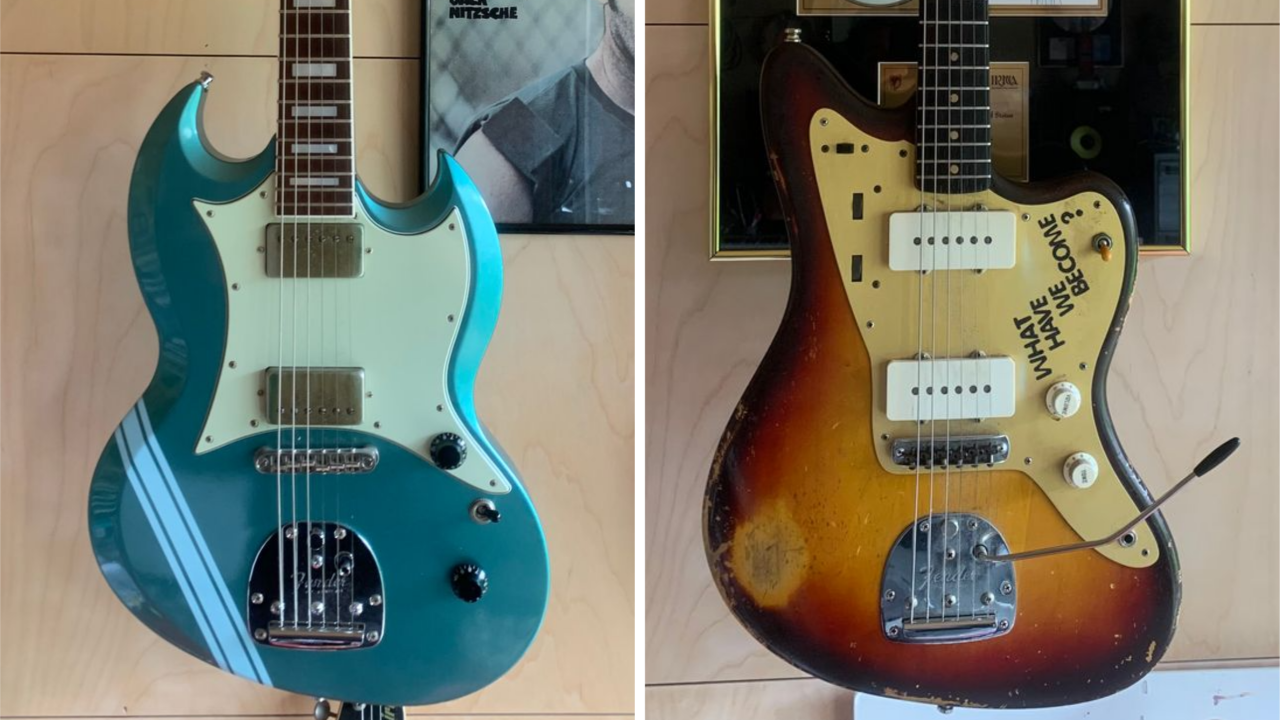
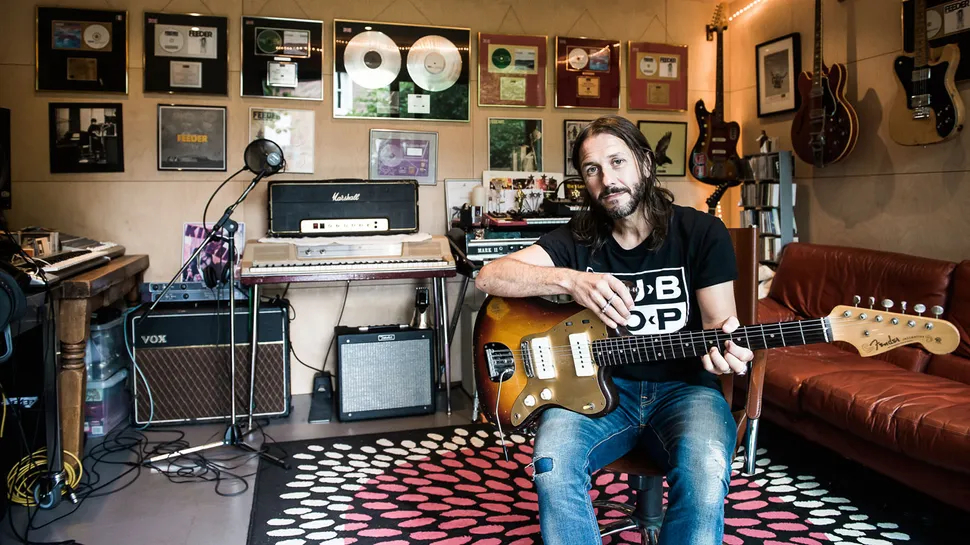
Studio tour: Feeder's Grant Nicholas reveals his guitar and recording setup
“Actually, the one I use for a lot of the recording is an original ‘59 Jazzmaster. It's good. It's got the gold scratch plate. Quite beaten up, but not as beaten up as the Jesus one, but it's like an original ‘59. I bought it just after Comfort And Sound was doing really well. You know, we earned a bit of money, and our manager said, ‘If you guys want to go and treat yourselves, go get a couple of guitars in Denmark Street.’ We're like, ‘Yes!’
"So we went to Vintage and Rare, and Taka bought a beautiful ‘60s Jazz Bass that he's still got, which is probably worth a lot more money now and I bought the Jazzmaster and a ‘70s sunburst Telecaster, which I've still got, which is absolutely beautiful.
“I change the strings on the ‘59 Jazzmaster very rarely, so it's got very dead strings, which I love for that certain thing. It's got a very woody, organic sound to it. Very low output. It's got a very flat, wide neck, but it's really nice for doing anything high up the neck. The intonation is really good on it. It's just a great guitar. I just don't mess with it.
There's a certain sound you get from a Strat, which is like no other guitar
“When I want a slightly more modern Jazzmaster sound, I'll go with something with more of my live setup, which will be a Seymour Duncan P-90 Quarter Pounder in the bridge. And then I'll use that and maybe I'll overdub that parts with that.
"I use a bit of Strat on this new record. They're great for a certain thing. There's a certain sound you get from a Strat, which is like no other guitar."
3. Fender Deville/Vox AC30/Marshall JMP
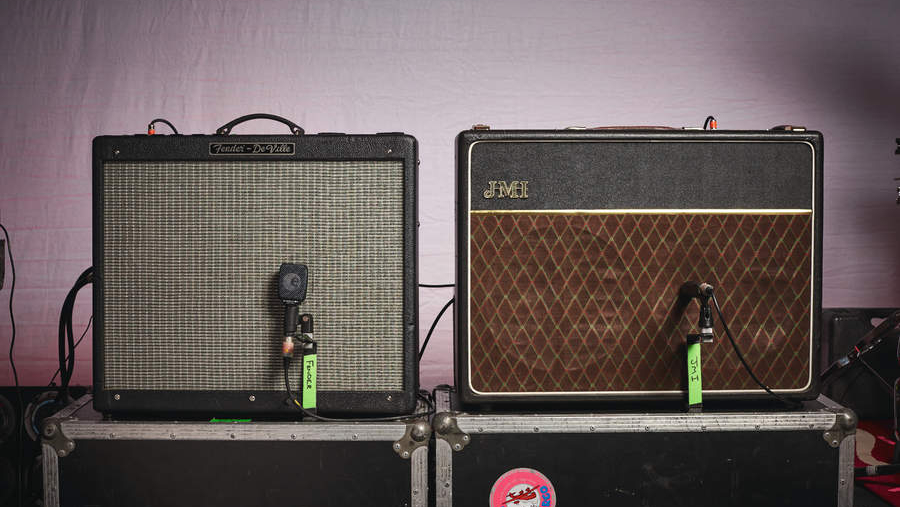
Moving on to amps and Nicholas admits he’s very fond of a trio of models that he’s used throughout his entire career. “I've gone back to my original setup, which is basically a Fender Twin – a ‘70s one – or Fender Deville, then either a Vox AC30 or JMI, which is a little bit closer to an original ‘60s one.”
“That's my live sound. You know, people expect me to have these massive stacks and stuff, but I’m really into combos. So you've got the mid-range of the AC30 and then you've got the top and bottom from the Fender – a bit more sparkle. That's been my sound for many years. I moved on to Mesa Boogie for a while and used the Vox with it, and it was great for Comfort And Sound in big arenas because it was a big rig and it was reliable, but I think the combos are more my thing, really."
Rounding out the trio is a Marshall JMP, which is over 50 years old at this point but still going strong.
“I've been using the same Marshall JMP, which is like a ‘70s one, which is a 50-watt head. It does one thing really well. I just crank it up. It's that instant mid-range AC/DC sound. That's when I use the humbucker guitars.
“I'll either use one of my Gibsons, I've got an Explorer with Seymour Duncan Antiquity pickups in, but I've also got an ESP – it looks a bit like an SG meets a Mustang. It’s also got the Seymour Duncan Antiquity pickups in. I've used that on pretty much the last three or four records to do all the humbucker stuff. And I just put that into the Marshall, crank it up, and it's just great for all the rhythm stuff.”
4. RoShi Pedals ELF
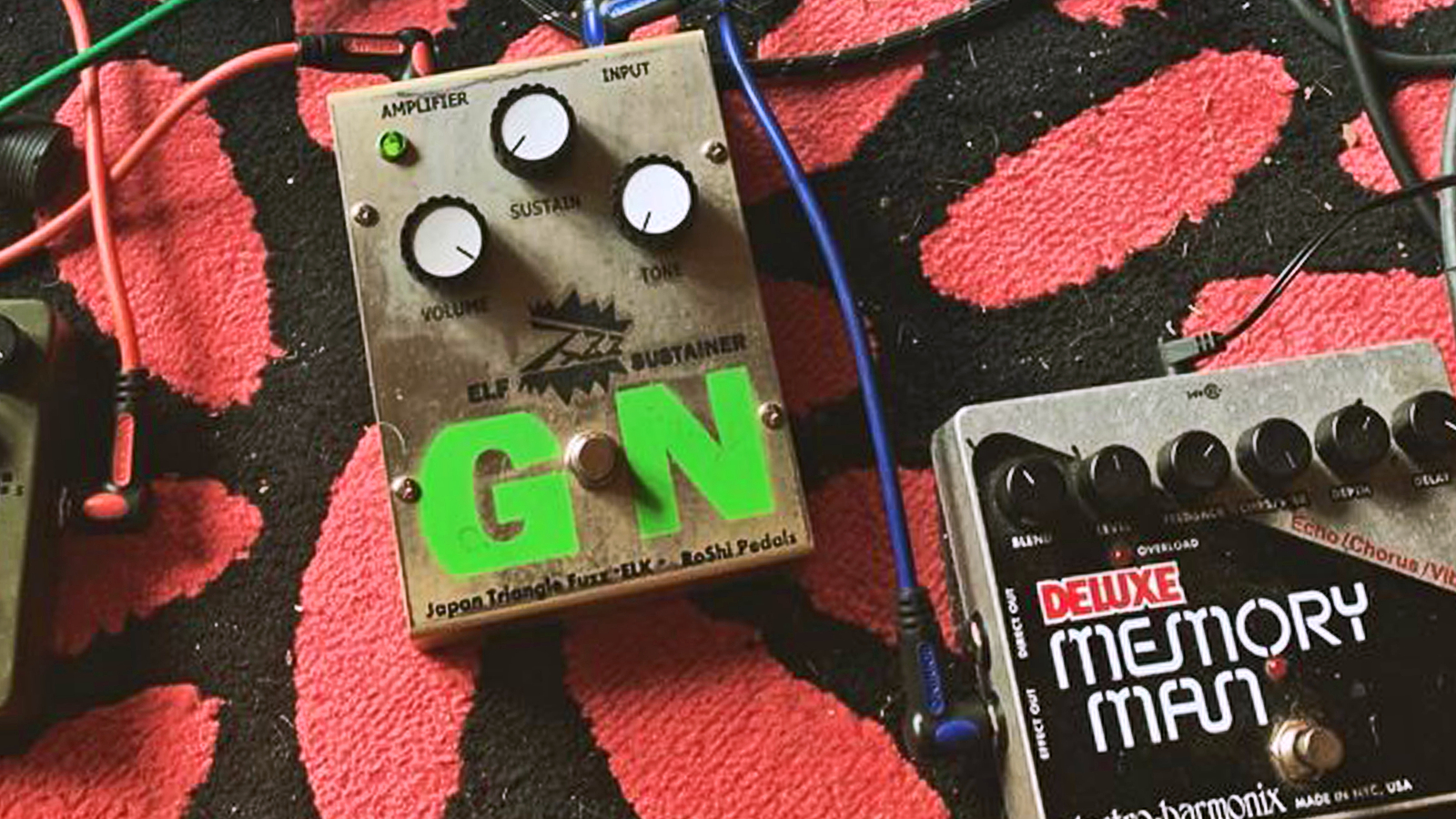
One listen to a Feeder record and it becomes abundantly clear that Nicholas is a fan of fiercely fuzzed-out guitars. Normally preferring the rounded tone of the Electro-Harmonix classic, the Big Muff or the spikey attack of the legendary Tone Bender, Grant divulges that his new favourite is made by Japanese builder RoShi Pedals and he was so taken with it that he named a song on the new record after it.
“I'm a fuzz junkie, as they say. I've got an obscene amount of fuzz boxes. I'm pretty obsessed with fuzz boxes. I’ve got loads and loads – some really nice ones. When I find one I like, I try and buy four or five of them. I mean, thank God I bought some of them back in the day because some of the old Tone Benders are going for serious money now. I love using Big Muffs and Tone Benders.
“My main pedal now is by RoShi pedals in Japan. He made me a couple of pedals that he was doing and he did some mods on there – I'm using those a lot. I use those on the record a lot, actually, on the last two records, they're called the ELF. I even named the song after it!
“That's kind of a Big Muff meets a Tone Bender. It's maybe slightly smoother, but it's got a very similar kind of vibe to it."
A visibly excited Grant reaches for a customized stompbox with a ‘GN’ proudly displayed on the pedal’s face. “He just sent me this one because I'm going to put one on my live pedalboard. I wanted a backup, so I've got one green one and he just sent me this new one, which has the GN on it.
“It looks a bit like a Big Muff – it's quite chunky. It's a little bit smaller than a Big Muff, but it's somewhere in between. It's great. It's very much my sound or the sound that people know me for or it suits the way I play.
“I've used that a lot, and it's a really great pedal. I've got so many fuzz boxes. I've got about three, no, probably four different types of Tone Benders, some original ones from the ‘60s."
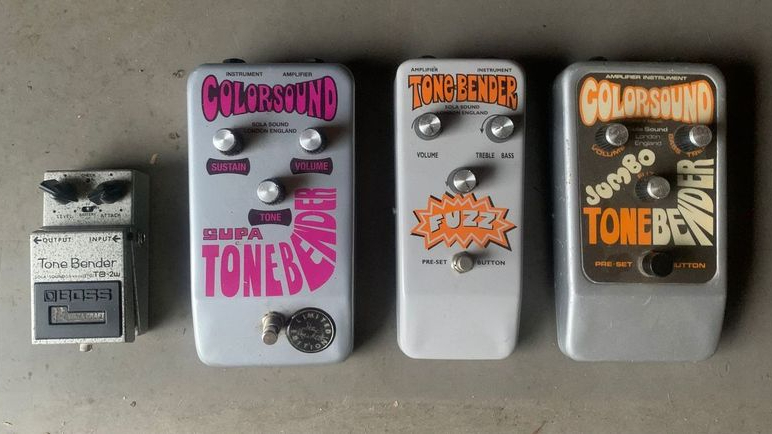
Despite his affinity with fuzz pedals, Grant reveals that he has a particular passion for a certain classic blue box from Boss.
“Boss Blues Drivers are great. I use those live. I've got the one with the Japanese mod on it [some components upgraded, said to react more like a tube amp]. I mean, even the standard one is great. I've got one of each and I tend to make them sound the same. They're great pedals, they are just reliable and they do a certain job. I'd be lost without one of those."
“On some songs where I move away from that classic Feeder sound, I'm known for – something with a bit more midrange – a bit more rock and roll, they're really great for that. Like, our single The Knock, it was one of the singles on the new record. I did use Tone Bender on that record but live, I haven't been using my Tone Bender, which is unusual. I've been using the Blues Driver but with the JHS Bolt as well. So I flicked the Bolt in just to give it a bit more lift in the chorus.”
Feeder’s new album Black/Red is out now and available on all major streaming services and you can catch the band live at the various dates throughout the UK and Europe listed below. For more information head to Feederweb.com.
- FRIDAY 24 MAY: In It Together 2024
- SATURDAY 22 JUNE: Isle of Wight Festival 2024
- SATURDAY 6 JULY: DocksFest 2024
- SUNDAY 7 JULY: Sign Of The Times Festival 2024
- FRIDAY 12 JULY: Tunes on the Sands 2024
- FRIDAY 26 JULY: Scarborough, UK
- THURSDAY 1 AUGUST: Tewkesbury, UK
- SATURDAY 3 AUGUST: App Fest
- SUNDAY 4 AUGUST: Kendal Calling 2024
- SUNDAY 18 AUGUST: A New Day Festival
- FRIDAY 30 AUGUST: Nottingham
- TUESDAY 24 SEPTEMBER: Paris, France
- WEDNESDAY 25 SEPTEMBER7: Antwerp, Belgium
- THURSDAY 26 SEPTEMBER7: Amsterdam, Netherlands
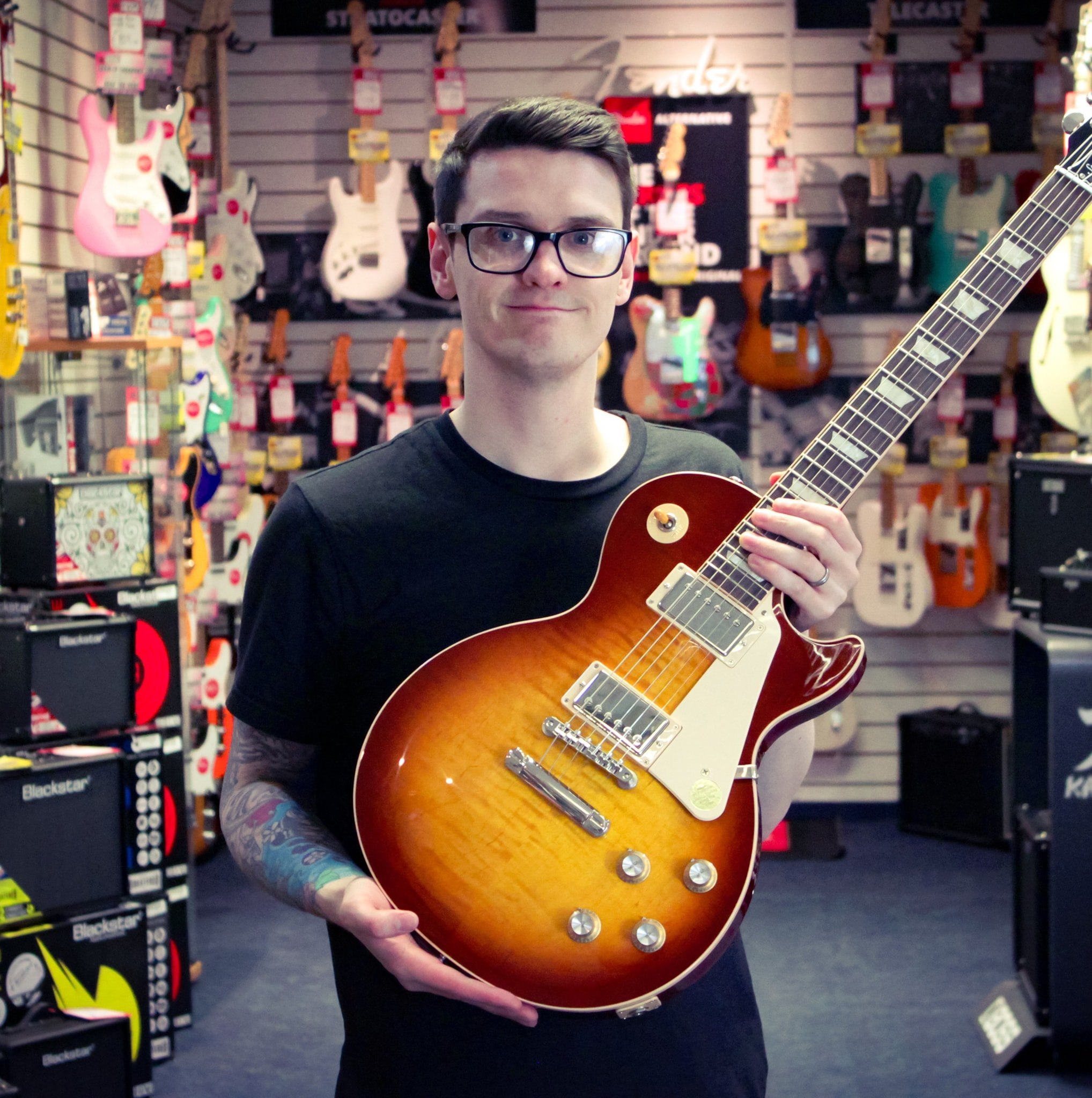
I'm a Senior Deals Writer at MusicRadar, and I'm responsible for writing and maintaining buyer's guides on the site. As part of my role, I also scour the internet for the best deals I can find on gear and get hands-on with the products for reviews. My gear reviews have been published in prominent publications, including Total Guitar, Guitarist, and Future Music, as well as Guitar World.com. I've also had the privilege of interviewing everyone from Slash to Yungblud, as well as members of Sum 41, Foo Fighters, The Offspring, and many more.
In a previous life, I worked in music retail, selling everything from digital pianos to electric guitars. I'm also a fully qualified sound engineer who holds a first-class Bachelor's degree in Creative Sound Production from the University of Abertay.



